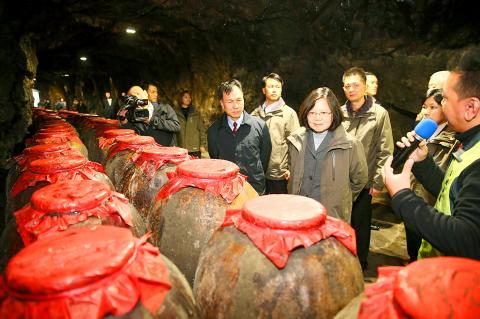The Chinese Nationalist Party (KMT) yesterday criticized amendments to the Labor Standards Act (勞動基準法), which were enacted last month, saying they had caused prices of most consumer goods to increase and forced shops and businesses to close during the Lunar New Year holiday.
KMT Culture and Communications Committee deputy director Hung Meng-kai (洪孟楷) said there has been much inconvenience and disruption in people’s lives since the amendments introduced the “one fixed day off and one flexible rest day” rule to enforce a 40-hour workweek policy and scrapped seven national holidays.
Hung said the new policy has made a mess of things, with most people demanding that the government review it and make adjustments.

Photo: CNA
“We urge Premier Lin Chuan (林全) and President Tsai Ing-wen (蔡英文) to reflect during the Lunar New Year holiday on how to improve this policy,” Hung said at a KMT news conference.
He cited as example funeral parlors in Pingtung City that had to shut down for five days for the holiday, as well as forcing the catering companies who supply food for worship and display at funeral services to close.
“How can a government policy affect funeral service providers? The implementation of ‘one fixed day off and one flexible rest day’ for workers has led to this result. It is rubbing salt in the wound for families with a deceased member in need of a proper funeral,” he said.
He received reports of shops and services having to shut down over the weekend, Hung said, adding that some companies had to cancel annual employee health check-ups and can no longer provide subsidies for overseas holidays because of the changes to the labor law.
“In a recent survey, more than 70 percent of respondents said they are experiencing pressure from rising prices in most consumer goods, and about 65 percent of people felt their lives were being inconvenienced by the new policy,” Hung said.
The policy has been in effect for more than a month, but most people still cannot adapt to the changes, he said.

Alain Robert, known as the "French Spider-Man," praised Alex Honnold as exceptionally well-prepared after the US climber completed a free solo ascent of Taipei 101 yesterday. Robert said Honnold's ascent of the 508m-tall skyscraper in just more than one-and-a-half hours without using safety ropes or equipment was a remarkable achievement. "This is my life," he said in an interview conducted in French, adding that he liked the feeling of being "on the edge of danger." The 63-year-old Frenchman climbed Taipei 101 using ropes in December 2004, taking about four hours to reach the top. On a one-to-10 scale of difficulty, Robert said Taipei 101

Nipah virus infection is to be officially listed as a category 5 notifiable infectious disease in Taiwan in March, while clinical treatment guidelines are being formulated, the Centers for Disease Control (CDC) said yesterday. With Nipah infections being reported in other countries and considering its relatively high fatality rate, the centers on Jan. 16 announced that it would be listed as a notifiable infectious disease to bolster the nation’s systematic early warning system and increase public awareness, the CDC said. Bangladesh reported four fatal cases last year in separate districts, with three linked to raw date palm sap consumption, CDC Epidemic Intelligence

US climber Alex Honnold left Taiwan this morning a day after completing a free-solo ascent of Taipei 101, a feat that drew cheers from onlookers and gained widespread international attention. Honnold yesterday scaled the 101-story skyscraper without a rope or safety harness. The climb — the highest urban free-solo ascent ever attempted — took just more than 90 minutes and was streamed live on Netflix. It was covered by major international news outlets including CNN, the New York Times, the Guardian and the Wall Street Journal. As Honnold prepared to leave Taiwan today, he attracted a crowd when he and his wife, Sanni,

Taiwanese and US defense groups are collaborating to introduce deployable, semi-autonomous manufacturing systems for drones and components in a boost to the nation’s supply chain resilience. Taiwan’s G-Tech Optroelectronics Corp subsidiary GTOC and the US’ Aerkomm Inc on Friday announced an agreement with fellow US-based Firestorm Lab to adopt the latter’s xCell, a technology featuring 3D printers fitted in 6.1m container units. The systems enable aerial platforms and parts to be produced in high volumes from dispersed nodes capable of rapid redeployment, to minimize the risk of enemy strikes and to meet field requirements, they said. Firestorm chief technology officer Ian Muceus said